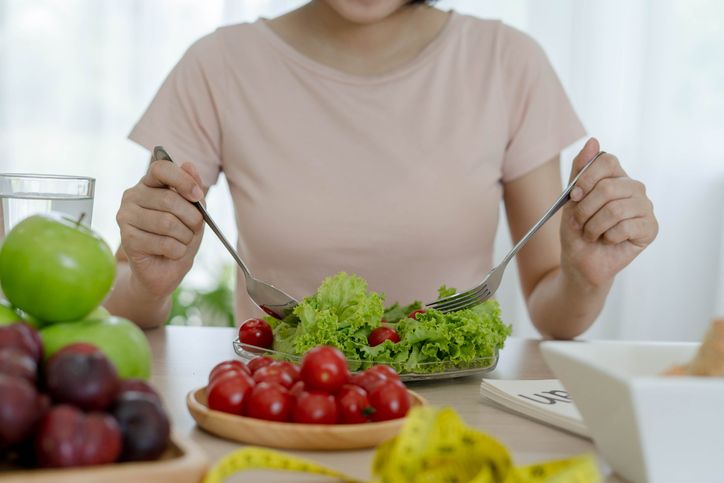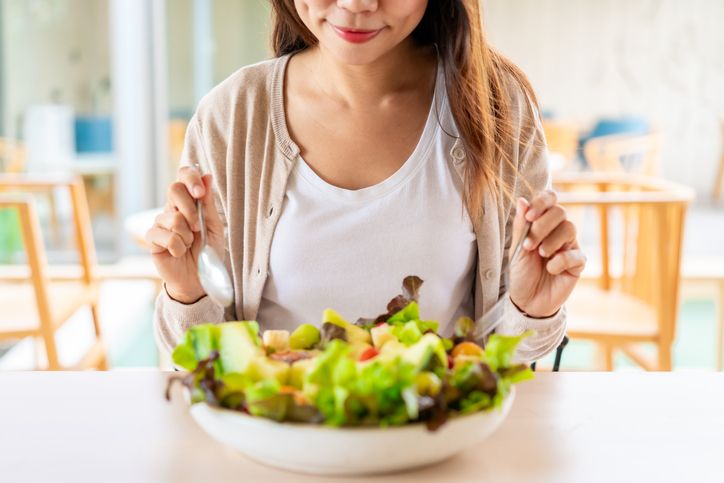
- Home
- Trend
- Weight Loss Strategies
- Acne Tips
- Hair Health Information
- Blemish Removal Tips
- Acne Scar Removal Tips
- Muscle Building Techniques
- Intimate Care Tips
- Postpartum Intimate Care
- Eye Bags Wiki
- Tips for Face Slimming
- Secret of Permanent Hair Removal
- Breast Enlargement Tips
- Cure to Snoring
- Marionette Lines
- Skin-Tightening Secrets

免費體驗
S6 Body Sculpting Treatment
1 Minute Self-Registration
Date should not be before minimal date
Adopting a vegan lifestyle not only benefits the environment but can also be a powerful tool for weight management. By focusing on wholesome, plant-based foods, you'll enjoy a variety of flavours and textures while nourishing your body with essential nutrients. Learn about detailed meal plan, expert tips, and insights to help you achieve your weight loss goals deliciously and responsibly.
1
Understanding Veganism for Weight Loss

Veganism is more than just a diet; it's a lifestyle that excludes all animal products, including meat, dairy, eggs, and even honey. By embracing a vegan diet, you consume a plethora of nutrient-dense foods that are lower in calories and saturated fats, making it an excellent choice for weight loss. Additionally, vegan diets are typically rich in fibre, which aids digestion and promotes a feeling of fullness, helping you avoid overeating.
The key to a successful vegan meal plan lies in incorporating a diverse range of plant-based ingredients. Fruits and vegetables form the foundation, providing a wide spectrum of vitamins, minerals, and antioxidants. Whole grains like quinoa, brown rice, and oats contribute complex carbohydrates and additional fibre. Legumes, such as lentils, chickpeas, and black beans, are excellent sources of plant-based protein, while nuts and seeds supply healthy fats and essential nutrients like omega-3 fatty acids. Plant-based milk alternatives made from soy, almond, or oat offer alternatives to dairy, and tofu and tempeh serve as versatile protein sources. With a variety of colourful and flavorful ingredients at your disposal, creating delicious and nourishing vegan meals becomes an enjoyable and rewarding part of your weight loss journey.

2
Benefits of a Vegan Weight Loss Meal Plan

Choosing a vegan weight loss meal plan comes with several advantages that go beyond shedding pounds:
Sustainable weight loss
When you opt for a vegan diet, you are likely to consume fewer calories and less saturated fat compared to a typical omnivorous diet. This can contribute to sustainable weight loss over time. Moreover, many vegan foods are rich in fibre, which promotes feelings of fullness and helps control appetite. Unlike fad diets that may lead to rapid weight loss followed by weight regain, a well-balanced vegan meal plan allows you to maintain a healthy weight without compromising essential nutrients.
Heart health
Research has shown that plant-based diets can be beneficial for heart health. By avoiding animal products and focusing on plant-based foods like fruits, vegetables, whole grains, nuts, and seeds, you reduce the intake of cholesterol and unhealthy fats that can contribute to heart disease. The abundance of antioxidants and phytochemicals in plant-based foods also supports cardiovascular health, lowering the risk of heart disease and high blood pressure.
Better digestion
Vegan diets are naturally high in dietary fibre, which plays a crucial role in maintaining a healthy digestive system. Fibre adds bulk to stool, aiding in regular bowel movements and preventing constipation. Additionally, a diet rich in fruits, vegetables, and whole grains provides prebiotics, which feed beneficial gut bacteria and promote a balanced gut microbiome, further supporting digestive health.
Improved energy levels
A well-planned vegan diet can supply your body with an array of essential vitamins, minerals, and nutrients. These nutrients are crucial for energy production, and by nourishing your body with plant-based foods, you provide it with the fuel it needs to function optimally. Many individuals report feeling more energised and mentally alert after adopting a vegan lifestyle.
Clearer skin
The consumption of heavily processed and unhealthy foods, often found in non-vegan diets, can contribute to skin issues like acne and inflammation. When you transition to a vegan diet that emphasises whole, unprocessed foods, your skin may benefit from the reduced intake of potential triggers. Additionally, the abundance of vitamins and antioxidants in plant-based foods can promote healthier, clearer skin.
Environmentally friendly
Embracing a vegan diet is an environmentally conscious choice. The production of animal products is associated with a significant ecological footprint, including deforestation, greenhouse gas emissions, and water pollution. By choosing plant-based foods, you contribute to a more sustainable planet and help combat issues related to climate change.
- Papaya For Weight Loss: The Secret Ingredient You’re Overlooking
- 6 Common Myths Debunked for Fitness Beginners – Learn 6 Key Tips to Burn Fat and Build Muscle in 3 Months!
- Can Sweating Lose Weight? Experts Debunk the Myth of “Sweat = Fat Burn”! Here’s the Real Signal Your Body Is Burning Fat
- Weight Loss for Busy People: 12 Tips to Lose Weight Effectively
3
How can I Include These 10 Popular Ingredients into My Plant Based Diet?

Pumpkin seeds
Pumpkin seeds are a healthy and flexible part of a vegan diet that can be used in many ways. They also have a lot of health benefits. They are a great source of protein, good fats, fibre, and important minerals like zinc and magnesium. Check out some creative ways to add pumpkin seeds to your veggie meal plan. To make a tasty and crunchy snack, roast pumpkin seeds with your favourite spices, like paprika, garlic powder, or a dash of tamari. Add pumpkin seeds to your smoothies or acai bowls to make them taste better and give them more nutrients. Add pumpkin seeds to your salads for a crunchier texture and a healthy dose of nutrients. Mix pumpkin seeds into your morning muesli or sprinkle them on avocado toast to add more nutrients to a healthy meal. You can even use pumpkin seeds as one of the main ingredients in homemade energy bars, along with nuts, dried fruits, and other healthy things.
Tempeh
Tempeh is a fermented soy product that has gained popularity in vegan diets due to its versatility and nutritional benefits. It is a fantastic source of plant-based protein and contains all essential amino acids, making it a complete protein. Additionally, tempeh is rich in fibre, vitamins, and minerals. To include tempeh in your plant-based diet, you can try marinating and grilling it for a savoury and satisfying main dish. You can also crumble it and use it as a meat substitute in stir-fries, tacos, or pasta dishes.
Black beans
Black beans are a staple in many vegan diets for their taste, texture, and nutritional content. They are an excellent source of protein, fibre, and essential nutrients such as iron and folate. Incorporate black beans into your meals by adding them to soups, salads, burritos, or veggie burgers. You can even make a hearty black bean chilli for a comforting and filling meal.
Whole grain bread
Whole grain bread is a healthier alternative to refined white bread and an essential part of a balanced vegan diet. It is made from whole grains like whole wheat, oats, or rye, providing more fibre, vitamins, and minerals compared to refined grains. Enjoy whole grain bread as a base for sandwiches, toast it for breakfast, or use it as a side with soups and salads.
Soy milk
Soy milk is a popular plant-based milk option and a staple in vegan diets. It is rich in protein, calcium, and other essential nutrients. Soy milk can be used as a dairy milk substitute in various recipes, including smoothies, cereals, coffee, and baking. It is also available in different flavours, such as vanilla and chocolate, to suit various preferences.
Frozen berries
Frozen berries, such as blueberries, strawberries, and raspberries, are not only delicious but also packed with nutritional benefits. They are rich in antioxidants, vitamins, and minerals, making them a valuable addition to your vegan meal plan. These colourful berries can be easily incorporated into various dishes. Add them to your morning smoothies, oatmeal, or chia puddings for a burst of flavour and a boost of nutrition. They also work well as toppings for vegan yoghourt or desserts, offering a delightful and healthy twist.
Chia seeds
Chia seeds are a nutritional powerhouse, packed with fibre, healthy fats, and plant-based protein. These tiny seeds can absorb liquid and create a gel-like consistency, making them perfect for creating delicious and filling chia puddings. To make a simple chia pudding, mix chia seeds with your favourite plant-based milk, sweetener, and flavourings like vanilla or cocoa powder. Let it sit in the refrigerator for a few hours or overnight and enjoy a nutritious and satisfying treat. Chia seeds can also be sprinkled over salads, added to smoothies, or used as an egg substitute in baking recipes.
Vegan cheese
Vegan cheese has seen significant advancements in taste and variety, making it a popular ingredient in vegan meal prep. Made from plant-based ingredients like nuts, soy, or coconut, vegan cheeses come in a wide range of flavours and textures. They can be used to create delicious plant-based versions of classic dishes, such as vegan pizzas, lasagnas, and grilled cheese sandwiches. Incorporate vegan cheese into your recipes to add creaminess and cheesy goodness without using any animal products.
Sweet potato
Sweet potatoes are not only delicious but also packed with vitamins, fibre, and antioxidants. They offer a multitude of culinary possibilities in vegan meal prep. Roast sweet potatoes with aromatic spices for a delightful side dish or use them as a base for nourishing buddha bowls. Mash sweet potatoes and incorporate them into muffins or pancakes for a naturally sweet and nutritious twist. With their vibrant colour and delightful taste, sweet potatoes are a versatile and wholesome addition to your vegan recipes, adding a dose of nourishment to your plant-based meals.
Hemp seeds
Hemp seeds are a fantastic source of omega-3 fatty acids and complete protein, making them a valuable ingredient for vegans. They have a slightly nutty flavour and can be sprinkled on top of various dishes to enhance both taste and nutrition. Add hemp seeds to your salads, soups, or avocado toast for a nutritious boost. They can also be blended into smoothies or used as a topping for plant-based yoghourt or cereal. With their versatility and nutritional benefits, hemp seeds are a great addition to any plant-based diet.
These popular ingredients have gained traction in vegan diets because of their nutrient-rich profiles and versatile uses. As more people embrace plant-based diets for health, environmental, and ethical reasons, these ingredients have become go-to choices to ensure a well-balanced and satisfying meal plan. With their diverse flavours and culinary possibilities, they offer a plethora of options for those seeking to add variety and nutrition to their plant-based dishes. Embracing these ingredients allows individuals to enjoy delicious, satisfying, and wholesome vegan meals while reaping the numerous health benefits associated with a plant-based lifestyle.

4
Expert Tips for a Successful Vegan Weight Loss Journey

As you embark on your vegan weight loss journey, besides from trying out to add popular ingredients into your vegan weight loss meal plan, incorporating these expert tips will help ensure a successful and enjoyable experience:
1. Stay Hydrated
Adequate hydration is essential for overall health and plays a crucial role in weight loss. Drinking plenty of water throughout the day not only keeps you hydrated but also supports your body's natural detoxification processes. Water helps flush out toxins, aids digestion, and can even help control appetite, making it easier to stick to your vegan meal plan.
2. Mindful Eating
Cultivate mindful eating habits to enhance your weight loss efforts. Pay attention to your body's hunger cues and eat when you're genuinely hungry. Mindful eating involves savouring the flavours, textures, and aromas of your meals, which can lead to greater satisfaction with smaller portions. By being mindful, you can avoid overeating and develop a healthier relationship with food.
3. Snack Smartly
It's natural to feel hungry between meals, but choosing healthy vegan snacks can make a significant difference in your weight loss journey. Opt for nutrient-dense options like raw nuts, seeds, fresh fruit, or veggie sticks with hummus. These snacks provide a balance of macronutrients and keep you satiated between meals, preventing unhealthy snacking on processed or high-calorie treats.
4. Exercise Regularly
Combining a well-planned vegan meal plan with regular exercise is a potent formula for weight loss and overall health improvement. Incorporate a mix of cardiovascular exercises, strength training, and flexibility exercises into your routine. Regular physical activity not only burns calories but also boosts your metabolism and helps preserve lean muscle mass during weight loss.
5. Limit Processed Foods
While there are a variety of delicious vegan processed foods available, it's best to consume them in moderation. Instead, prioritise whole, unprocessed foods to maximise the health benefits of your vegan diet. Whole foods, such as fruits, vegetables, whole grains, legumes, nuts, and seeds, are rich in essential nutrients, fibre, and antioxidants that support weight loss and overall well-being.
6. Meal Prep
Planning and preparing your meals ahead of time can be a game-changer in your weight loss journey. When you have healthy and nutritious vegan meals readily available, you're less likely to make impulsive food choices, especially when hunger strikes. Meal prepping also saves time and ensures you have balanced meals, making it easier to stick to your weight loss goals.
7. Consider Body Sculpting Treatment
In addition to following a vegan meal plan and incorporating exercise, you may also consider body sculpting treatments to enhance your weight loss results. Non-invasive body sculpting treatments can target stubborn fat areas and help you achieve a more contoured and toned physique. These treatments can be used as a complement to your lifestyle changes and are often performed by licensed professionals, such as Perfect Medical's S6 Body Sculpting Treatment, which uses a high-powered bio-laser to reach deep into the fat layers and melt away any extra fat. After all, even though a veggie diet can help people who are trying to lose weight, treatment would still be the fastest way to lose fat and give you a good shape at the same time!

免費體驗
S6 Body Sculpting Treatment
1 Minute Self-Registration
Date should not be before minimal date
5
Conclusion

Remember, sustainable weight loss takes time and patience. Be kind to yourself and celebrate your progress along the way. By adopting a balanced vegan meal plan, staying active, opt for suitable treatment and taking care of your body, you can achieve your weight loss goals while improving your overall health and well-being.

免費體驗
S6 Body Sculpting Treatment
1 Minute Self-Registration
Date should not be before minimal date
FAQ

1. Can I lose weight on a vegan diet?
Yes, losing weight on a vegan diet is entirely possible and can be quite effective for many individuals. A well-balanced vegan diet often consists of nutrient-dense foods such as fruits, vegetables, whole grains, legumes, nuts, and seeds. These foods tend to be lower in calories compared to animal-based products, while also being rich in essential vitamins, minerals, and fibre. The increased fibre intake can help promote feelings of fullness and satiety, which may lead to reduced overall calorie consumption. Additionally, a vegan diet typically has lower amounts of saturated fats, which can contribute to weight loss and improved heart health.
2. Are vegan meal plans deficient in nutrients?
Vegan diets have the potential to provide all necessary nutrients for a healthy lifestyle. However, it requires careful planning to ensure you meet your nutritional needs. While plant-based foods offer a wide array of vitamins, minerals, and antioxidants, some nutrients are more challenging to obtain solely from plants. For example, vitamin B12, which is primarily found in animal products, is essential for nerve function and red blood cell production. Vegans should consider taking a vitamin B12 supplement or consuming fortified foods to meet their requirements. Other nutrients to pay attention to include iron, calcium, omega-3 fatty acids, and vitamin D.
3. What is Body Sculpting Laser?
Body sculpting laser, also known as non-invasive or minimally invasive laser treatments, is a cosmetic procedure designed to target specific areas of the body to reduce fat and contour the shape without surgery. This innovative technology utilises laser energy to penetrate the skin and target fat cells, causing them to release their contents, which are then naturally eliminated from the body. The procedure is generally painless and requires little to no downtime, making it an appealing option for individuals seeking to enhance their body contours without undergoing surgery. Body sculpting laser treatments can be used on various areas of the body, including the abdomen, thighs, arms, and love handles, to achieve a more toned and sculpted appearance.
4. Can I build muscle on a vegan diet?
Absolutely! Building muscle on a vegan diet is entirely feasible with proper planning and attention to macronutrient intake. Plant-based foods can be excellent sources of protein, which is essential for muscle growth and repair. Foods like beans, lentils, tofu, tempeh, seitan, edamame, quinoa, and various nuts and seeds provide ample amounts of protein. Combining these protein sources with regular strength training exercises can help stimulate muscle growth and improve muscular strength. It's also essential to ensure you consume sufficient calories to support muscle development. Additionally, vegan athletes and bodybuilders often use protein supplements, such as pea protein, rice protein, or soy protein powders, to supplement their dietary protein intake and support their fitness goals.
5. How Can Low-Level Lasers Help with Weight Loss?
Low-level laser therapy (LLLT), also known as cold laser therapy, is a non-invasive treatment that utilises low-power lasers or light-emitting diodes (LEDs) to stimulate specific points on the body. While low-level laser therapy is not a direct method for weight loss, some studies suggest that it may complement a weight loss regimen by promoting various mechanisms that could aid in the process. LLLT is believed to stimulate the mitochondria within fat cells, promoting the release of stored fat and aiding in its breakdown. Additionally, LLLT may help improve blood circulation, which can enhance the delivery of nutrients and oxygen to tissues, potentially supporting metabolic processes.








